Sep
9
2010
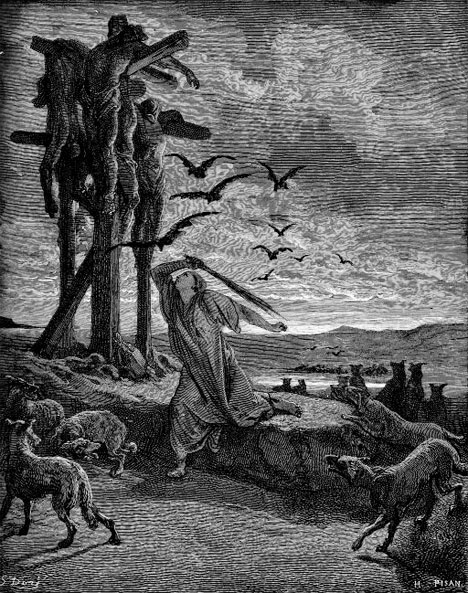
“Now Rizpah the daughter of Aiah took sackcloth and spread it for herself on the rock, from the beginning of harvest until the late rains poured on them from heaven. And she did not allow the birds of the air to rest on them by day nor the beasts of the field by night.” 2 Samuel 21:10
NOTE: THIS POST HAS BEEN REMIXED AND INCLUDED IN GOD’S KITCHEN.
At the heart of the Bible Matrix is Testing. Although all the major narratives follow the pattern, many of the minor ones do too. If Adam had not failed his initial “qualifying round,” he would have progressed to the next stage of dominion. We know this because we see others later in the Bible move beyond this first round to greater glory. For instance, Daniel’s first challenge mirrors Adam’s challenge exactly. He was offered kingdom food and refused it.
Continue reading
Comments Off | tags: AD70, Atonement, Exodus, Herod, Jericho, Nebuchadnezzar, Postmillennialism, Samuel, Temple, Two witnesses, Witness | posted in Biblical Theology, Christian Life, The Last Days
Aug
26
2010
or Behold, I Make All Things Bloody

A critic wrote that Mel Gibson, with The Passion of the Christ, invented a new cinematic genre: the religious splatter film. This was intentionally disrespectful, but of course there is some truth to it. Perhaps more truth than we realise. God desired a world covered by blood.
The content of this post has been revised and included in Bible Matrix II: The Covenant Key.
________________________________________
[1] A summary of James B. Jordan, Re-Creation in the Ascension Offering. Notice that the Tabernacle furniture itself, of course, also aligns with this structure of events, being a microcosmos.
[2] See Half the Blood.
[3] See also The Whole Bloody Bible.
2 comments | tags: AD70, Ascension, Herod, James Jordan, Leviticus, Nero | posted in Biblical Theology, Quotes
Aug
24
2010
or Mutton Dressed Up as the Lamb
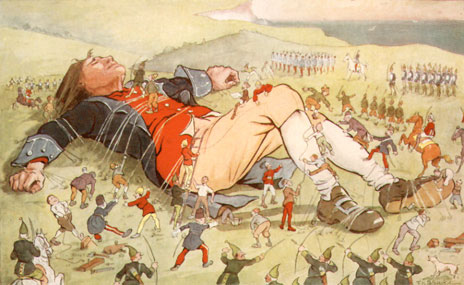
Doug Wilson recently made a distinction between what usually passes for hypocrisy in Christian circles, and the kind practiced openly by the self-righteous:
One of my central pastoral responsibilities is that of keeping Christians away from hypocrisy, of the kind described in the New Testament. But this task, not surprisingly, is often misunderstood — and the reason it is misunderstood is that there are always lots of people who don’t want to be kept out of that kind of hypocrisy, and misdirection is that name of the game.
Continue reading
Comments Off | tags: AD70, Doug Wilson, Esther, Haman, Herod, Hypocrisy | posted in Biblical Theology, Quotes
Aug
14
2010

“Do you suppose that I came to give peace on earth? I tell you, not at all, but rather division.” Luke 12:51
Another weird idea James Jordan presents in his Revelation lectures is the premise that the famous Four Horsemen of the Apocalypse represent the gospel. As Uri Brito wrote a couple of years ago, first you think Jordan is nuts; then, as you continue to study, you think he is less nuts. Finally you give in and accept his genius, because his premise is vindicated by the similar use of the symbols in the Old Testament, and the literary structure of the event.
Continue reading
Comments Off | tags: AD70, Balaam, Herod, John, Literary Structure, Numbers, Revelation, Systematic typology, Zechariah | posted in Bible Matrix, Biblical Theology, The Last Days, The Restoration Era
Aug
9
2010
An Exhortation to Be A Fruitful Tree
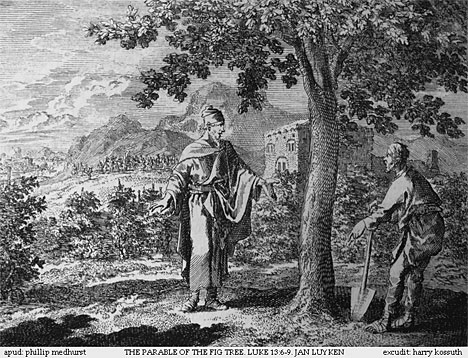
Tabernacles was the final annual feast, a Godfest to be thrown by Jews as a ministry to Gentiles. At the Feast of Clouds [1], every household temporarily became a new house of God, a “local branch” of the Tabernacle, a “priesthood of all believers.” Of course, we see this fulfilled in the book of Acts. Just as we see Paul exhort the Ephesians (Gentiles!) to put on the mediatorial body-armour of the High Priest, [2] his final exhortation to the Roman Christians alludes to not only Israel’s feasts but Israel’s priesthood. Pretty much every church he established was a “booth” made of natural Jewish branches and ingrafted Gentile branches. [3] At Pentecost, the same cloud that received Jesus filled the house. [4] Now every household of faith was a Tabernacle, a glorious cloud with a government of human angel-elders. [5] In the Bible’s literary structure, a recurring motif at Tabernacles is good fruit, godly offspring. God wants more than just a covering of leaves. As in Eden, future generations hang upon wise government.
Continue reading
8 comments | tags: AD70, Add new tag, Atonement, Doug Wilson, Feasts, Genesis, Laver, Literary Structure, Paul, Roman Catholicism, Romans, Systematic typology, Tabernacles, Temple | posted in Bible Matrix, Biblical Theology, The Last Days
Aug
6
2010
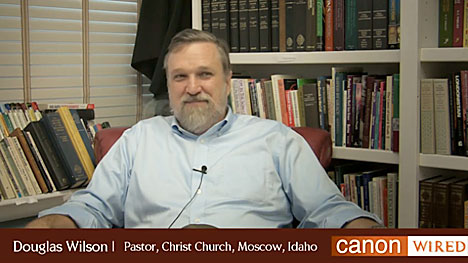
Here, Doug Wilson explains why the accusation that he is “mono-covenantal” is false.
It seems to me that if any distinction is to be made, it is not between pre- and postlapsarian history. The dichotomy Paul describes in Galatians is not between God’s Covenant with Adam and His Covenant in Christ, but between the Mosaic Covenant and the Adamic Covenant.
Continue reading
1 comment | tags: AD70, Covenant Theology, Galatians, Genesis, Paul, Postmillennialism, Revelation 20 | posted in Biblical Theology, The Last Days
Aug
2
2010
or The Art of Noise
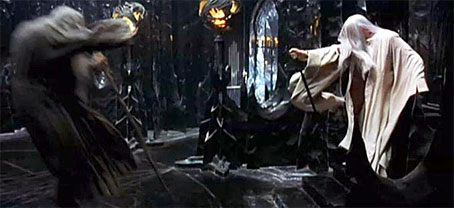
Must be wizards week!
For the word of God is living and powerful, and sharper than any two-edged sword, piercing even to the division of soul and spirit, and of joints and marrow, and is a discerner of the thoughts and intents of the heart. (NKJV) Hebrews 4:12
But someone will say, “You have faith, and I have works.” Show me your faith without your works, and I will show you my faith by my works. (NKJV) James 2:18
The firmament was a veil to hide God’s throne from Man until he was ready to see God face to face. Of course, we see types of this throughout the Bible, Job, Jacob and Moses being notable examples. But no man had seen God until after Christ ascended and was presented as Facebread.
Your face is a veil of flesh that hides your brain, the source of your intentions. Your head is a microcosm of the Tabernacle at one level, and your entire body at another. You are a Garden and a Land.
Deceivers mask their true intentions with facial expressions and body language. Good spies can even pass a lie detector test. Between their true intentions and the flesh that is supposed to be communicating it, there is a deliberate disconnect. As in the Garden, it is the mind of a beast speaking with the eyes and mouth of a man.
Continue reading
Comments Off | tags: AD70, Cain, Doug Wilson, Martyrdom, Oswald Chambers, Psalms, Tabernacle, Veil, Worship, Zechariah | posted in Bible Matrix, Biblical Theology, The Last Days
Jul
29
2010

After reading (“orthodox”) preterists for a few years, the failure of modern evangelicals to read the New Testament in its historical context, and to understand its constant allusions to Old Testament event structures now floors me. How is it that we so easily underestimate the importance of the destruction of Judaism in AD70? And worse than that, how is it that we fail to understand that the imminent warnings of the apostles as prophets related to that event? Here’s a perfect example that hits both these ugly birds with one stone; some pure gold from Peter Leithart this week:
Continue reading
5 comments | tags: AD70, Church History, Evangelicalism, Peter Leithart, Postmillennialism, Preterism | posted in Against Hyperpreterism, Biblical Theology, The Last Days
Jul
9
2010

Michael F. Bird recently wrote:
The Jerusalem council achieved a via media by finding in Scripture a justification for the inclusion of Gentiles within the church without requiring circumcision and placing upon Gentiles only the obligation to avoid idol food and sexual immorality. Yet the Jerusalem council also permitted the existence of two parallel theologies: one theology where the Gentiles were uncircumcised equals in a renewed Israel with holiness constituted by the Spirit and another theology where uncircumcised Gentiles were guests in an Israelite remnant that still defined holiness through Torah observance. The Jerusalem council’s decisions seem optimized in a setting where Jewish Christians and Gentile Christians remain in parallel rather than integrated, especially in relation to shared meals. The council did not stipulate the standard of law observance to be upheld for Eucharistic fellowship to ensue.
Bird makes some interesting observations in his post, but two parallel theologies? Is that really what was going on? And does the council’s decision apply to modern observance of the Torah (ie. Messianic Jews)?
Continue reading
Comments Off | tags: AD70, James, Nazirite, Paul, Replacement Theology, Revelation, Tabernacle of David, Tabernacles, Temple | posted in Biblical Theology
Jul
1
2010
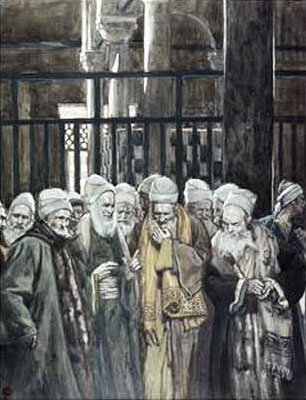
As I’ve mentioned here before, and in Totus Christus, the reference to the “man of sin” in Revelation is the sixth stanza of what is usually a seven stanza format. Only, in the case of this “Adam,” his seventh stanza is missing. [1] There is no Shekinah, no rest, no transfiguration, no bestowed glory. He crowned himself, so for him there would be no true crown.
Continue reading
Comments Off | tags: AD70, antichrist, Ark of the Covenant, Corinth, Covenant Theology, Herod, Literary Structure, Man of sin, Paul, Systematic typology | posted in Bible Matrix, Biblical Theology, Ethics, The Last Days, Totus Christus



































